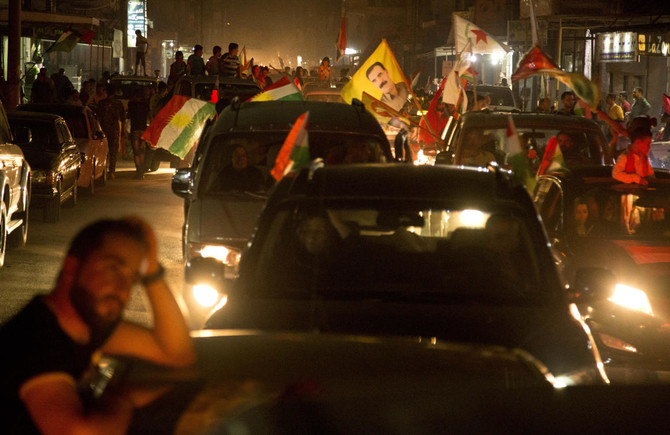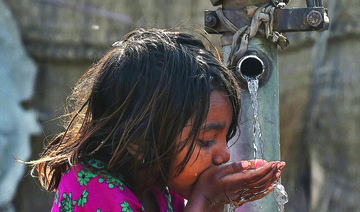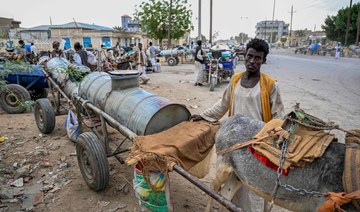KOBANI, Syria: Almost three years after Kurdish fighters defeated Daesh in the Syrian town of Kobani, residents still mourn the dead and feel abandoned by their foreign allies as they struggle to rebuild.
Daesh’s defeat in predominately Kurdish Kobani in early 2015 helped turn the tide against the ultra-militant group and marked the start of a more open US military relationship with the Kurdish YPG militia.
But much of the town near the border with Turkey was destroyed, leaving it facing a huge reconstruction challenge and in need of help from the allies that had supported the fight to defeat Daesh, including the United States.
Electricity still works only a few hours a day and regularly cuts out. The Internet, using a Turkish communications signal, is expensive and unreliable.
That, local officials say, is because aid quickly dried up, and the town’s problems could soon be replicated across parts of northern Syria as Daesh cedes ground.
“There were never (reconstruction) projects that reflected the scale of destruction,” said Khaled Barkal, a vice president in the local government.
Kurdish ties with the West are complicated by local rivalries and alliances, and by Kurdish efforts to assert autonomy in areas captured from Daesh.
Local officials also accuse the West of trying to appease NATO ally Turkey, which sees the YPG as an extension of the PKK, a Kurdish group waging an insurgency against the Turkish government.
“Turkey doesn’t want life to return here,” Barkal said.
Ankara opposes the YPG role in capturing Arab-majority areas such as Raqqa, saying it threatens demographic change. Kurdish self-assertion in Iraq and Syria has also brought charges of mistreatment of Arabs, which officials deny.
Western diplomats in the region say support for the YPG in the battle against Daesh cannot extend to bolstering a Kurdish-led project to cement an autonomous region.
Washington opposes plans for autonomy in northern Syria, with the international community seeking a nationwide resolution to Syria’s more than six-year-old civil war.
HIGH PRICE
The people of Kobani fear more upheaval lies ahead. Syrian President Bashar Assad wants to win back control of all Syria, and Kurdish-led authorities are seeking to cement regional autonomy through elections, which could increase tensions.
Residents say they willingly paid the price of defeating Daesh and are grateful for US help in the victory.
But the price was high, in terms of lives and destruction.
Shereen Hassan was among the first fighters killed defending Kobani, which was under siege from Daesh for four months. Family members learned of her death when they tried to call her and Daesh militants answered her phone.
“They said: ‘We’ve killed your daughter and we’re posting a picture of her head on Facebook’,” Hassan’s brother Ednan Hassan said at their home.
The image was later posted, showing a grinning militant holding the 19-year-old’s severed head.
Fighters are buried in a military cemetery on the edge of town where yellow YPG flags flutter above gravestones. Portraits of dead Kurdish fighters dot the walls of the local administration and hang from rows of lamp posts.
The violence did not end completely when the battle for Kobani was won. In June 2015, months after Daesh was defeated in the town, the group launched a raid that killed nearly 150 people there including 11 members of Hassan’s family.
Such experiences have militarised society and the small scale of aid leaves people unwilling to rely on outside help.
“The international community left us,” Hassan said. “Before the war, every home had a gun. Now it’s every man.”
Men in the town run a night watch, taking turns to drive around armed with Kalashnikov assault rifles.
“We protect ourselves,” said locksmith Khaled Aldamr, cutting keys in his shop.
’KOBANI IS TIRED’
Aldamr, whose home was levelled by an air strike, said business had improved for him, but that reflected the scale of the damage that during the fighting, not an improvement in the local economy.
“When Daesh came, they kicked down doors to occupy houses, breaking the locks. People need new ones,” he said, pointing at a pile of locks displayed in the window.
His services are required as new buildings spring up where homes were reduced to rubble. Many are empty so far.
The population of Kobani and nearby areas has neared its original 200,000 after people returned, Barkal said, although only 40,000 live in the town itself with fewer inhabitable spaces.
“Kobani is tired. I’m lucky. Many have no work,” Aldamr said. “We hope to rebuild better than before, which could happen if skilled Kurds abroad come back or send money. But we’re trapped. Borders are closed.”
Turkey closed its crossing with Kobani in 2015, and has since built a concrete wall that stretches hundreds of kilometers along the frontier.
Goods come through Iraq’s Kurdish region, or are smuggled from areas under Assad’s control. People complain of a lack of medicine.
Despite the problems, and the possibility of more violence, the people of Kobani say they will not give up.
“We’ll defend ourselves against whoever comes, to the last drop of blood,” Barkal said.
Syrian town struggles to cope alone after key victory over Daesh
Syrian town struggles to cope alone after key victory over Daesh

Afghan Taliban government says to attend third round of UN-hosted Doha talks

- Mujahid told local media on Sunday the decision had been made to send a delegation, the members of which would be announced later, because it was deemed “beneficial to Afghanistan”
KABUL: Taliban authorities will attend the third round of United Nations-hosted talks on Afghanistan in the Qatari capital, a government spokesman told AFP on Sunday, after snubbing an invitation to the previous round.
“A delegation of the Islamic Emirate will participate in the coming Doha conference. They will represent Afghanistan there and express Afghanistan’s position,” Taliban government spokesman Zabihullah Mujahid said of the talks, which are scheduled to start June 30.
The participation of the Taliban authorities in the two-day conference of special envoys on Afghanistan had been in doubt after they were not included in the first round and then refused an invitation to the second round in February.
Mujahid told local media on Sunday the decision had been made to send a delegation, the members of which would be announced later, because it was deemed “beneficial to Afghanistan”.
Hamas response to Gaza ceasefire proposal ‘consistent’ with principles of US plan, leader says

- Egypt and Qatar said on June 11 that they had received a response from the Palestinian groups to the US plan
CAIRO: Hamas’ response to the latest Gaza ceasefire proposal is consistent with the principles put forward in US President Joe Biden’s plan, the group’s Qatar-based leader Ismail Haniyeh said in a televised speech on the occasion of the Islamic Eid Al-Adha on Sunday.
“Hamas and the (Palestinian) groups are ready for a comprehensive deal which entails a ceasefire, withdrawal from the strip, the reconstruction of what was destroyed and a comprehensive swap deal,” Haniyeh said, referring to the exchange of Israeli hostages for Palestinian prisoners.
On May 31, Biden laid out what he called a “three-phase” Israeli proposal that would include negotiations for a permanent ceasefire in Gaza as well as phased exchanges of Israeli hostages for Palestinian prisoners held in Israel.
Egypt and Qatar — which along with the United States have been mediating between Hamas and Israel — said on June 11 that they had received a response from the Palestinian groups to the US plan, without giving further details.
While Israel said Hamas rejected key elements of the US plan, a senior Hamas leader said that the changes the group requested were “not significant”.
Red Sea crisis intensifies economic strain on Yemenis ahead of Eid

- Sales have decreased by 80 percent
- Over 1.2 million civil servants have not received salaries in eight years, and hundreds of thousands have lost their jobs
DUBAI: Yemen, suffering from nearly a decade of civil war, now faces an additional challenge: a crippled economy further strained by the escalating crisis in the Red Sea.
Market vendors in Sanaa’s Old City, the Al-Melh, claim that sales have decreased by 80 percent, according to a report by Chinese news agency Xinhua.
Shopkeepers attribute this decline to recent increases in sea shipping costs, which have driven up wholesale prices.
This situation reflects the broader economic crisis in Yemen, where rising sea shipping costs have increased prices across the board, making basic Eid essentials unaffordable for many.
To help ease financial strain, an exhibition was organized in Al-Sabeen Park, where families were able to sell homemade goods.
Despite these efforts, Yemen’s economic problems persist. According to the UN, the decade-long war has pushed millions into poverty. Over 1.2 million civil servants have not received salaries in eight years, and hundreds of thousands have lost their jobs. The Norwegian Refugee Council reports that four out of five Yemenis face poverty, and over 18 million people urgently need humanitarian aid.
Water crisis batters war-torn Sudan as temperatures soar

- The country at large, despite its many water sources including the mighty Nile River, is no stranger to water scarcity
- This summer, the mercury is expected to continue rising until the rainy season hits in August
PORT SUDAN, Sudan: War, climate change and man-made shortages have brought Sudan — a nation already facing a litany of horrors — to the shores of a water crisis.
“Since the war began, two of my children have walked 14 kilometers (nine miles) every day to get water for the family,” Issa, a father of seven, said from North Darfur state.
In the blistering sun, as temperatures climb past 40 degrees Celsius (104 degrees Fahrenheit), Issa’s family — along with 65,000 other residents of the Sortoni displacement camp — suffer the weight of the war between Sudan’s army and the paramilitary Rapid Support Forces (RSF).
When the first shots rang out more than a year ago, most foreign aid groups — including the one operating Sortoni’s local water station — could no longer operate. Residents were left to fend for themselves.
The country at large, despite its many water sources including the mighty Nile River, is no stranger to water scarcity.
Even before the war, a quarter of the population had to walk more than 50 minutes to fetch water, according to the United Nations.
Now, from the western deserts of Darfur, through the fertile Nile Valley and all the way to the Red Sea coast, a water crisis has hit 48 million war-weary Sudanese who the US ambassador to the United Nations on Friday said are already facing “the largest humanitarian crisis on the face of the planet.”
Around 110 kilometers east of Sortoni, deadly clashes in North Darfur’s capital of El-Fasher, besieged by RSF, threaten water access for more than 800,000 civilians.
Medical charity Doctors Without Borders (MSF) on Friday said fighting in El-Fasher had killed at least 226.
Just outside the city, fighting over the Golo water reservoir “risks cutting off safe and adequate water for about 270,000 people,” the UN children’s agency UNICEF has warned.
Access to water and other scarce resources has long been a source of conflict in Sudan.
The UN Security Council on Thursday demanded that the siege of El-Fasher end.
If it goes on, hundreds of thousands more people who rely on the area’s groundwater will go without.
“The water is there, but it’s more than 60 meters (66 yards) deep, deeper than a hand-pump can go,” according to a European diplomat with years of experience in Sudan’s water sector.
“If the RSF doesn’t allow fuel to go in, the water stations will stop working,” he said, requesting anonymity because the diplomat was not authorized to speak to media.
“For a large part of the population, there will simply be no water.”
Already in the nearby village of Shaqra, where 40,000 people have sought shelter, “people stand in lines 300 meters long to get drinking water,” said Adam Rijal, spokesperson for the civilian-led General Coordination for Displaced Persons and Refugees in Darfur.
In photos he sent to AFP, some women and children can be seen huddled under the shade of lonely acacia trees, while most swelter in the blazing sun, waiting their turn.
Sudan is hard-hit by climate change, and “you see it most clearly in the increase in temperature and rainfall intensity,” the diplomat said.
This summer, the mercury is expected to continue rising until the rainy season hits in August, bringing with it torrential floods that kill dozens every year.
The capital Khartoum sits at the legendary meeting point of the Blue Nile and White Nile rivers — yet its people are parched.
The Soba water station, which supplies water to much of the capital, “has been out of service since the war began,” said a volunteer from the local resistance committee, one of hundreds of grassroots groups coordinating wartime aid.
People have since been buying untreated “water off of animal-drawn carts, which they can hardly afford and exposes them to diseases,” he said, requesting anonymity for fear of reprisal.
Entire neighborhoods of Khartoum North “have gone without drinking water for a year,” another local volunteer said, requesting to be identified only by his first name, Salah.
“People wanted to stay in their homes, even through the fighting, but they couldn’t last without water,” Salah said.
Hundreds of thousands have fled the fighting eastward, many to the de facto capital of Port Sudan on the Red Sea — itself facing a “huge water issue” that will only get “worse in the summer months,” resident Al-Sadek Hussein worries.
The city depends on only one inadequate reservoir for its water supply.
Here, too, citizens rely on horse- and donkey-drawn carts to deliver water, using “tools that need to be monitored and controlled to prevent contamination,” public health expert Taha Taher said.
“But with all the displacement, of course this doesn’t happen,” he said.
Between April 2023 and March 2024, the health ministry recorded nearly 11,000 cases of cholera — a disease endemic to Sudan, “but not like this” when it has become “year-round,” the European diplomat said.
The outbreak comes with the majority of Sudan’s hospitals shut down and the United States warning on Friday that a famine of historic global proportions could unfold without urgent action.
“Health care has collapsed, people are drinking dirty water, they are hungry and will get hungrier, which will kill many, many more,” the diplomat said.
UAE, Iran discuss bilateral relations

DUBAI: The United Arab Emirats Minister of Foreign Affairs, Sheikh Abdullah bin Zayed, had a phone conversation on Saturday with Iran's acting Minister of Foreign Affairs, Ali Bagheri Kani, to discuss the bilateral relations between the two countries.
During the call, they exchanged Eid Al-Adha greetings and explored ways to enhance cooperation that would serve the mutual interests of their countries and peoples, contributing to regional security and stability.
They also reviewed several issues of common interest, as well as recent developments in both regional and international arenas.















